Michigan Wine Competition Results 2013
This past week, I had the pleasure of judging at the Michigan Wine Competition which was held at Michigan State University. The organizers of the Competition- Linda Jones, Karel Bush, Chris Cook and Sherri Goodreau- ran the 36th annual event with precision. Michigan State University, The Michigan Grape and Wine Industry Council, The Michigan Department of Agriculture and Rural Development and the winemakers, grape growers and winery workers of Michigan are a testament to what Midwest wine can accomplish when everyone pulls in the same direction.
Best of Class Winners
Sparkling, Black Star Farms, BeDazzled, 2012 (Chardonnay, Pinot Noir, Pinot Meunier)
Semi Dry White, Boat House Vineyards, Knot Too Sweet Riesling, 2012
Dessert, Brys Estate Vineyard and Winery, “Dry Ice” Riesling Ice Wine, 2011
Dry White, Chateau Fontaine, Pinot Blanc, 2012
Semi Dry Red, Karma Vista Vineyards, Devil’s Head Red, NV (Noiret, Dornfelder)
Dry Red, Peninsula Cellars, Cabernet Franc, 2011
Observations from the 2013 Michigan Wine Competition:
- Northern Michigan wineries took about two-thirds of the medals. (If you’re keeping score, the final was North 204 medals, South 111 medals.)
- However, a Southern Michigan winery, Fenn Valley, had the most medals with 22 total winners. Chateau Grand Traverse on the Old Mission Peninsula had the second largest number of medals with 17.
- In something of a surprise, wineries located in regions where the Traverse City area is not considered Northern Michigan won 18 medals. Mackinaw Trail, which has tasting rooms in Petoskey, Mackinaw City and Manistique, won a gold medal for their Late Harvest Riesling. Harbor Springs Vineyard and Winery won a gold for their Cottage White.
- All the Best of Class winning wines were made from vinifera grapes, except one. Karma Vista won Best of Class for their Devil’s Head Red which is a Noiret/Dornfelder blend. Noriet, a Cornell hybrid, can be overly peppery but winemaker Joe Herman said he got the inspiration from the Rolling Stones’ “Sympathy for the Devil” to produce a lighter, Chianti style wine with no oak.
- Further evidence of the growing dominance of old world wines in Michigan were the gold medal winners. Only five of 42 wines that received gold medals or higher were made from hybrid grapes. Of these hybrid Gold Medal winners, four contained Chambourcin; Fenn Valley Capriccio, White Pine Winery’s Dune Shadow Red and Lawton Ridge’s Two Handed Red. Gill’s Pier’s Gold Medal winning Just Unleashed is a Frontenac blend and the aforementioned Best of Class Karma Vista red is a Noiret blend.
- Riesling was the big medal winner as a varietal. Out of 315 medals, 56 were for Michigan Rieslings. Top quality Riesling is now produced across Michigan as evidenced by the 31 wineries that won medals for their Rieslings. Black Star Farms, Brys Estate and Chateau Grand Traverse each had four Rieslings that won awards at the Competition.
Michigan wine has a reputation for being among the best in the Midwest and the country. The number of prominent judges who traveled to East Lansing from outside the region attests to the high level of national interest in Michigan wine. However, it would be inaccurate to say that Michigan wines are uniformly the best in the Midwest. (I have now judged four major Midwestern wine competitions and tasted hundreds, if not thousands, of Midwest wines. While still a long way from being an expert, I have tasted a lot of Midwest wine in the past three years.)
Surprisingly, thirty percent of wines entered in the Michigan Competition did not medal. As Paul Gospodarczyk documented in his excellent 2012 Midwest Wine Press article, “Making Wine Contests Work for Your Winery” the percentage of wines not receiving medals in Midwest wine competitions is usually significantly less than 30%.
Many of the wines that did not medal at the Michigan competition were vinifera wines. This raises a question about how consistent quality can be maintained while continuing to rapidly increase production of old world wines. Some wineries are making excellent Rieslings, Rhone varietals and Pinot clones, but quality is not yet uniform.
Production of hybrid wines in some areas of Michigan might be more be more practical despite the marketing challenges. Certainly, there were many excellent hybrid wines on display at the Michigan Wine Competition. Michigan’s talented growers and winemakers might be in the best position to elevate hybrid wines to a level where serious wine drinkers will take notice.
However, as the winners at this year’s Competition prove, Michigan can produce certain styles of traditional wines that rival the best regions in the world.

Enrico Peterlunger of the University of Udine in Friuli Italy, Dr. Paolo Sabbatini, Michigan State University, Katie Cook, University of Minnesota and Linda Murphy, wine writer from Heraldsburg, California
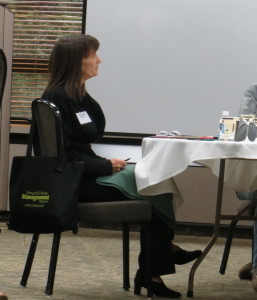
Sommelier and judge Ellen Landis from Half Moon Bay, California toured Leelanau wineries after the Competition

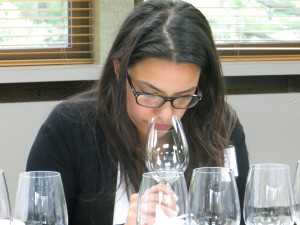
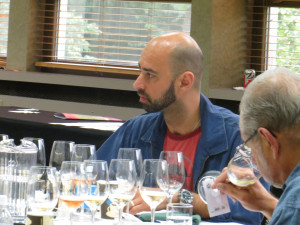
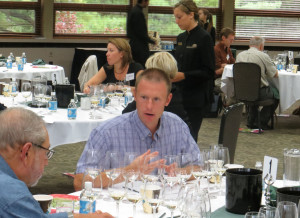
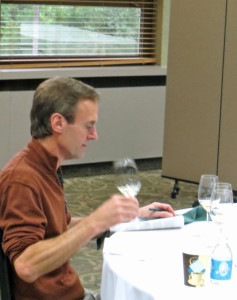
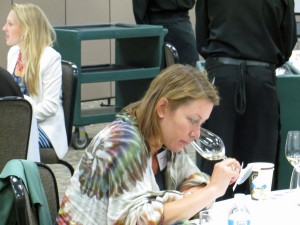

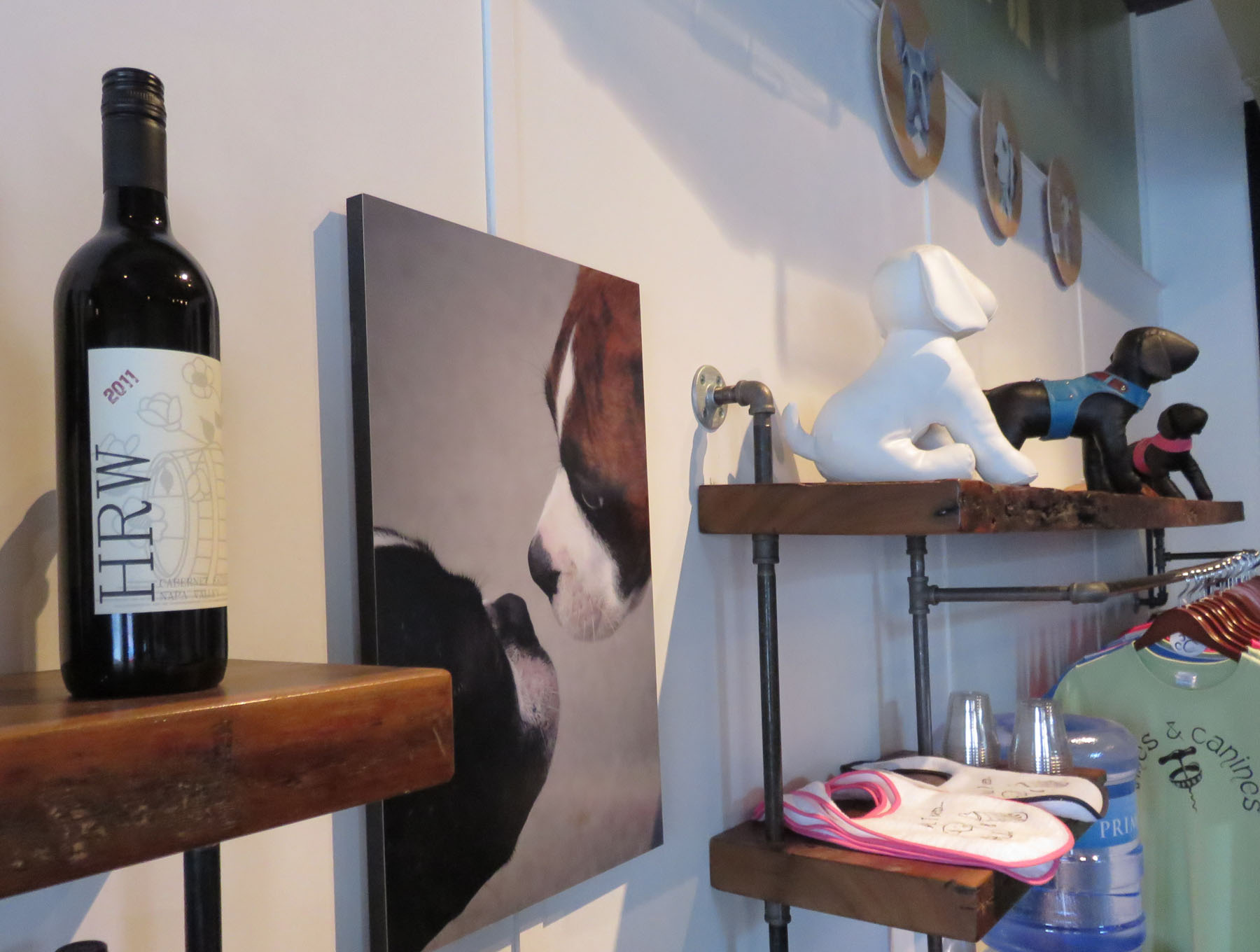
When is a competition not a competition, when 70% of the competitors are winners. This is why wine competitions have become a joke, not to mention the fact that it seems like there is one every week or so. It’s kind of like grade school soccer where you get a trophy for participation.
No offense to the judges but the bar needs to be set way way higher. Kind of like high school grade inflation where everybody is on the honor roll.
Good points, different wine contests have different criteria for medals. At the Michigan Competition, judges were instructed not to award Bronze medals unless the wine was remarkable in some manner. When a winery pays to enter a wine in a competition, one would think they winery is sending their best product(s). However, I have tasted flawed wines in competitions which leaves me scratching my head.
This is why I wish there would be some kind of Midwest wine critic board putting out some non bias actual indication of quality. It is pretty hard to order wine based on the award(s) they have won and trust you are going to get a product that matches the hype
Mark very nice summary article on the competition. Well done.
Thanks Paolo!
We appreciate your support of Midwest Wine Press. We’re proud to tell the unfolding story of Michigan wine and the pivotal role that Michigan State plays in the growth of the industry.
Mark
I feel that this year in particular there was a very good panel of judges with diverse backgrounds. Once again it was a very well run competition. One of the best in the country in my opinion.
I agree Bill, wine competition judges should come from all backgrounds. As a “consumer” judge, I always try to represent the tastes of the average tasting room visitor. Some of the somms don’t think fruit wine has “character” but we Midwesterners know better.